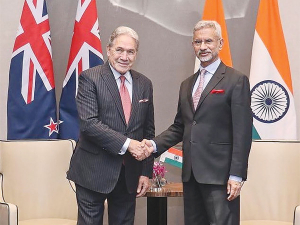New Order
OPINION: If old Winston Peters thinks building trade relations with new nations, such as India, isn't a necessary investment in our future, he has rocks in his head.
 Foreign Affairs Minister Winston Peters meeting his Indian counterpart Subrahmanyam Jaishankar during a visit to New Delhi.
Foreign Affairs Minister Winston Peters meeting his Indian counterpart Subrahmanyam Jaishankar during a visit to New Delhi.
This past week has seen another round of negotiations between India and New Zealand to produce a free trade agreement (FTA) between the two countries.
A team of NZ officials from several government departments, led by the Ministry of Foreign Affairs and Trade (MFAT), have been in Delhi for talks with their Indian counterparts. These talks are between officials only and no politicians have been involved in the negotiations.
This latest round of talks is part of the ongoing process to reach agreement on an FTA. Every month there are four or five days of 'virtual' negotiations, followed up by face-to-face meetings between the two parties.
The FTA consists of 19 chapters or separate parts and is identical in structure to other FTAs that NZ has secured. The focus ranges from issues around rules, phytosanitary standards, a chapter on composition, services and, of course, trade.
While NZ is pressing for dairy to be included in the FTA, the chances of this are nil, and we are not being singled out in this regard. Britain and Australia, who have FTAs with India, also had dairy excluded from their respective agreements.
A couple of issues on the trade side that NZ is pushing hard on are apples and honey. Currently, India imposes a 50% tariff on apples which limits our ability to access that market. While India does produce apples, they are of course seasonal and what the NZ negotiators are trying to do is convince the Indians to allow NZ fruit in only when the local supply dries up.
The NZ position is that having apples on the market for 12 months of the year ensures that consumers have continuous supply which makes good marketing sense.
What NZ is saying is we will fill that gap in local supply and be gone when Indian fruit come on the market. This is an argument that we have successfully pursued with other primary products in the Northern Hemisphere.
The other issue is honey, and NZ is again trying to get access for manuka honey which has a high price point, well above the local produce.
The FTA with India is seen as a high priority for our government and it's proceeding at pace. The stakes are high. Over the past couple of weeks, NZ will have had about 15 people in Delhi at various stages of this latest round of talks. It's believed India will likely have double that number of people.
At the same time, the political tempo is being kept up with Trade Minister Todd McClay making regular trips to India along with Prime Minister Christopher Luxon there in March and Foreign Minister Winston Peters there some weeks ago.
Recent weather events in the Bay of Plenty, Gisborne/Tairawhiti, and Canterbury have been declared a medium-scale adverse event.
DairyNZ's chief executive Campbell Parker says the 2024/25 dairy season reinforces the importance of the dairy sector to New Zealand.
A New Zealand agribusiness helping to turn a long-standing animal welfare and waste issue into a high-value protein stream has won the Australian dairy sector's top innovator award.
OPINION: A bumper season all around.
Dairy Women's Network (DWN) has announced that Taranaki dairy farmer Nicola Bryant will join its Trust Board as an Associate Trustee.
Rural Women New Zealand (RWNZ) says it welcomes the release of a new report into pay equity.